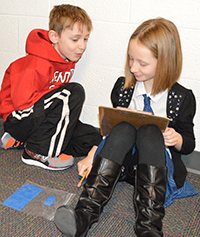Gathered on the floor around teacher Karen Swanson, her third-graders were not looking down at a worksheet or a pop quiz, but up. They watched Swanson as she used her hands, drew models on the board and asked frequent questions to prompt exploration of a new math topic: area.
With the concept introduced, students worked in pairs using blocks and graph paper to create different shapes with the same area. Then it was back to the floor to discuss just how in the hexahedron that’s possible.

The “launch, explore, summarize” formula for Swanson’s math lessons is one kind of teaching that results from the Georgia math model, an inquiry-based approach to elementary school math in its second year at the district. The model breaks up the more lecture-based model that has existed before, Swanson said.
“It’s getting the students to be more creative in their thinking, and thinking in different ways, rather than us just teaching algorithms,” she said. “It’s more through discovery, more through an exploration.”
Students Justine Meade and Julian Witt divided labor, as Julian placed blue blocks together while Justine sketched shapes on paper. She found herself erasing and redrawing the shapes until she found the right formula.
“I just realized something,” Justine reasoned aloud. “I can switch this around, but I want a space between. If I do it this way I’ll have nine right here, and then I was realizing I can do 10 that way.”
And that was music to Swanson’s ears.
“We all reason about how we might tackle this task,” she said. “The difference is you used to say, ‘This is how you do it.’ Now they’re free to solve it whatever way they choose, as long as it’s right.”
‘Giving Students a Math Mindset’
Kent ISD math consultant Rusty Anderson helped advise Kent City during its consideration of new models to bring to its math curriculum. Georgia’s math curriculum takes what he described as a “progressive” approach to get students thinking differently.
“Through a lot of conversation and learning about what they wanted a math classroom to sound and look like, they wanted students to be mathematicians instead of sitting and being given all the math,” he said.
The Georgia model is implemented in a few Kent County districts, but is not the norm. It’s not easily adopted, Anderson explained, because it represents dramatic changes. Student assessment moves from the traditional emphasis on quizzes to capturing student understanding through observational data and formative data.
Anderson continues to consult with Kent City, where he said he has observed Georgia math and helped the district avoid potential barriers.
“It’s really giving students a math mindset, different from the mindset we had going through a traditional progression,” Anderson said. “They’re beginning to love math, realize math is around them.”
In Swanson’s classroom, students reconvened, their graph paper filled in with different shapes.

“All this learning you’re doing today is taking you back to what we learned in multiplications,” Swanson told the class. “It’s taking you back to that, but it’s also taking you forward to start thinking about space, and to think about area as we learn how to measure space.
“It’s all connected. You would not be able to do area if you did not understand multiplication. That’s why we start out that way.”
Students are already responding to the new system, Swanson said, asking more inquisitive questions and finding solutions of their own.
“What I’m noticing now, even compared with two years ago, students coming in are working better as groups,” she said. “They are more articulate by sharing their understanding. They have a variety of strategies compared to any one strategy.”
CONNECT









